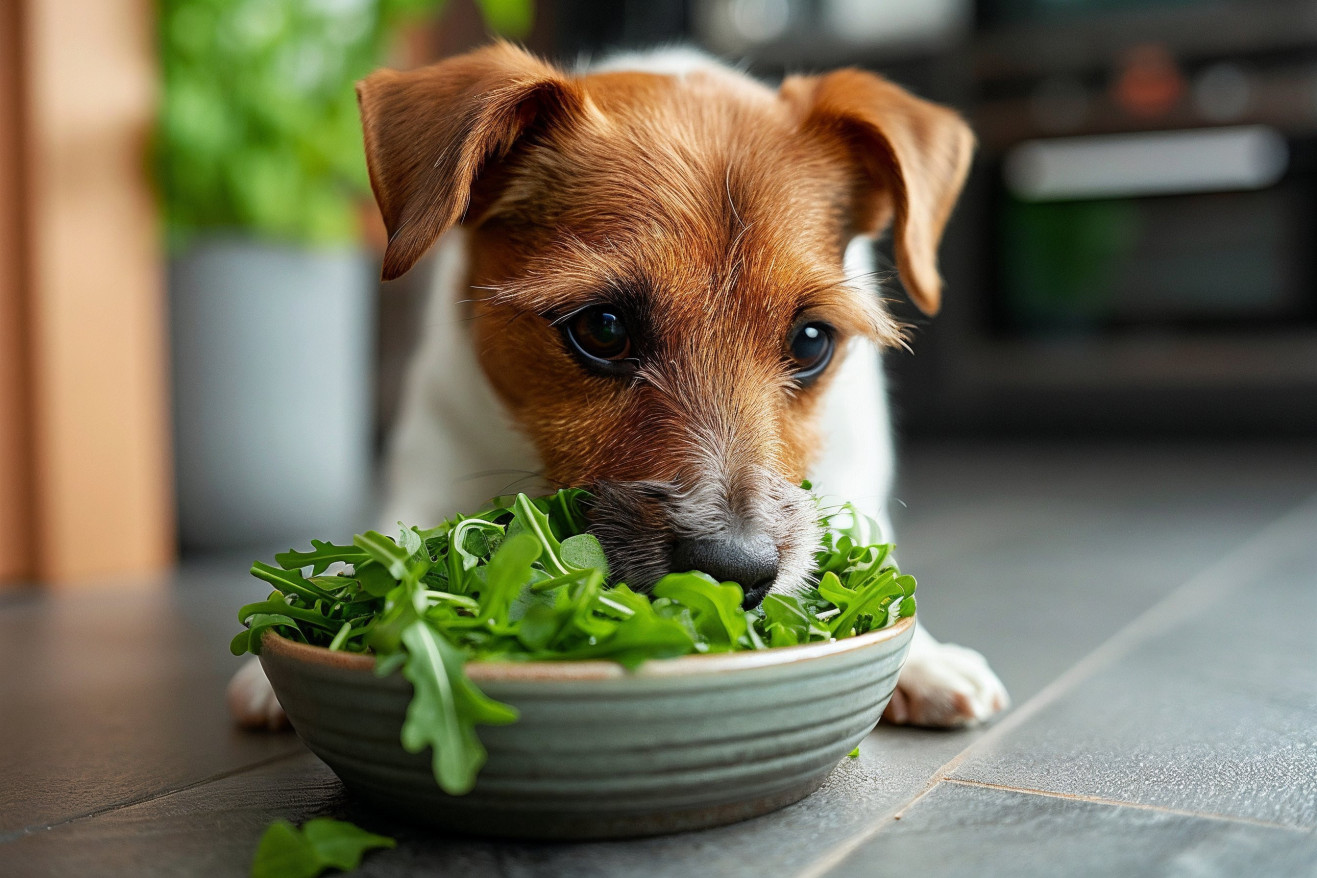Can Dogs Eat Arugula? Nutritional Insights and Safety Tips
2 February 2024 • Updated 6 February 2024

Arugula is a delicious, peppery addition to our salads, but is it good for dogs? It turns out that arugula is safe for dogs to eat in small amounts. Arugula is full of vitamins and antioxidants, which can be good for dogs. However, it’s important to be mindful of portion sizes and talk to your vet if your dog has thyroid problems, as arugula contains goitrogens, which can interfere with thyroid hormones.
This article will review veterinary clinical nutrition research and studies on the dietary habits of dogs to explain the place of vegetables like arugula in a dog’s diet. It will also cover the nutritional advantages and potential drawbacks of giving arugula to dogs.
The goal is to help dog owners better understand whether or not they should feed this leafy green to their pets, as well as tips for the best ways to prepare and serve it.
Can dogs eat arugula?
Arugula’s Nutrient-Rich Profile for Dogs
Beyond being a popular salad green, arugula is a leafy green with a peppery taste. It offers dogs a variety of nutrients that can help support their overall health.
According to Medical News Today, arugula is packed with vitamins and minerals that are important for dogs. For example, vitamin K is important for bone metabolism and mineralization, which is the process of minerals being deposited into the bones. This means it’s important for bone health. Meanwhile, calcium is important for bone and teeth health, and vitamin C helps the immune system as an antioxidant.
Arugula is rich in antioxidants, which help protect the body’s cells from damage by free radicals. Arugula also contains alpha-lipoic acid, which can be especially helpful for dogs with diabetes by helping to lower blood sugar levels and increasing insulin sensitivity, according to Verywell Fit.
For dogs that are watching their weight, arugula is a great option because it’s low in calories. According to WebMD, 100 grams of arugula contains 25 calories, meaning it’s a low-calorie option that’s still packed with nutrients.
While arugula allergies in dogs are rare, they can happen, especially in dogs that have a history of food allergies. It’s a good idea to keep an eye out for any signs of an allergic reaction when you introduce new foods to your dog, including arugula.
This will help you make sure that you’re including arugula in your dog’s diet in a way that’s safe and healthy for them based on their unique needs and tolerances.
Goitrogens in Arugula and Their Impact on Dogs
If you’re concerned about your dog’s thyroid health, one thing to keep in mind is the goitrogens in certain foods. Goitrogens, which are found in certain foods, can inhibit the function of the thyroid gland, which is responsible for controlling metabolism. In the case of raw arugula, the goitrogens in the plant can block the thyroid’s ability to absorb iodine, which can lead to hypothyroidism.
This means that dogs who already have thyroid issues are at an especially high risk if they eat raw arugula. A-Z Animals notes that dogs who already have thyroid issues should avoid raw arugula to prevent further issues with thyroid hormone production. However, cooking arugula will greatly reduce its goitrogenic effect, making it a safe option for dogs with these sensitivities.
If you’re thinking about adding arugula to your dog’s diet and they have a thyroid issue or are at risk, it’s best to talk to a vet. A vet will be able to give you personalized advice to make sure that adding arugula or any other food to your pet’s diet won’t have a negative impact on their health.
Lightly steaming arugula is the best way to minimize its goitrogenic effect while still reaping the nutritional benefits that make it a great snack for your dog.
Veggies for Vitality: Can Dogs Eat Arugula?
While dogs are primarily carnivores, vegetables can be a helpful addition to their diet. The American Kennel Club explains that dogs don’t need vegetables, but they can benefit from the vitamins, minerals, and fiber that they provide. With its high vitamin and antioxidant content, arugula can be a great way to add these benefits to your dog’s diet.
The ASPCA advises that arugula should be given to dogs in moderation. To start, give your dog a small piece of arugula to see how it reacts to it. If there is no reaction, PetMD recommends adding chopped arugula to your dog’s food, making sure to give no more than a tablespoon per 20 pounds of body weight and feeding it a few times a week.
This will help ensure that arugula is a special treat and not a regular part of your dog’s diet.
You can give your dog arugula raw, lightly steamed, or mixed with its regular food to make it more appealing. Steaming arugula is especially helpful because it reduces the goitrogenic compounds that can interfere with thyroid function.
As with any new food, make sure to introduce arugula and other new ingredients to your dog’s diet slowly and watch for signs of stomach upset or allergies. This will help you keep your dog’s diet in balance and make sure that new foods are introduced in a way that won’t cause health problems.
What Do Cruciferous Vegetables Do in a Dog’s Diet?
Cruciferous vegetables, which include a wide variety of vegetables such as broccoli, cauliflower, and arugula, are perhaps best known for their sulfur-containing compounds, which are responsible for their strong tastes and smells. In addition to being packed with vitamins, minerals, and other antioxidants, such as sulforaphane and isothiocyanates, these sulfur compounds have been shown to have a number of health benefits, but also some potential downsides when it comes to feeding them to dogs.
The potential benefits of these compounds have been well-documented, with one PubMed study in particular demonstrating that the isothiocyanate benzyl isothiocyanate (BITC) can induce apoptosis in canine lymphoma and leukemia cells. This means that cruciferous vegetables may have anticancer effects, which could be a very exciting development for dogs with cancer and their caregivers.
That said, while these vegetables have a number of health benefits, it’s important to note that they also contain goitrogens and should be fed in moderation, especially to dogs with thyroid problems.
The interplay between these benefits and potential downsides should be taken into account when deciding whether or not to feed these vegetables to your dog.
For example, Dogs Naturally Magazine suggests that vegetables like arugula should make up about 10% of a dog’s diet to ensure that they’re getting a well-rounded and nutritionally balanced diet. With the right preparation, which can include lightly steaming them to reduce their goitrogen content, cruciferous vegetables can be a healthy addition to your dog’s diet.
What Veterinarians Say About Arugula in Dog Food
Veterinarians agree that arugula can be a healthy and safe addition to a dog’s diet, especially when given in moderation. Arugula is a source of fiber, which is important for digestive health, as well as vitamins A and K, which are important for vision and bone health.
It also contains minerals like manganese and potassium, which are important for general health, according to veterinarians. Still, as the American Kennel Club points out, it’s important to make sure that you don’t give your dog too much arugula, as this can lead to digestive upset, including diarrhea.
The Clinical Nutrition Service at Cummings School also notes that while dogs can produce some vitamins, like Vitamin C, on their own, they need to get other vitamins and minerals in their diet, some of which they can get from arugula.
That said, especially for dogs with specific health issues, veterinarians recommend that pet owners work with them to develop a diet plan that meets their pet’s individual nutritional needs.
This is where wellness tools like the National Resource Council’s in-depth nutritional guides can be helpful, as they can help pet owners understand what their dogs need from their diets in terms of essential nutrients, which can help them determine whether or not they want to include arugula in their dog’s diet.
While arugula can be a healthy treat, it’s important to remember that it should be used to supplement, not replace, the essential nutrients that a dog gets from its regular diet. Pet owners should work with their veterinarians to get personalized advice on the best diet for their dogs, as veterinarians can help pet owners understand what their dogs need from their diets based on their individual nutritional needs.
The Bottom Line on Letting Your Pup Snack on Arugula
As this article has shown, arugula can be a healthy addition to your dog’s diet if it’s consumed in moderation. This leafy green is packed with essential vitamins and minerals, including vitamins B, C, and K, and potassium, iron, and calcium, according to A-Z Animals.
Arugula is also a hydrating and low-calorie option, which can make it a good choice for dogs who are watching their weight. That said, it’s important to make sure that your dog doesn’t eat too much arugula, as its high fiber content can lead to digestive issues.
If your dog has thyroid problems, it’s especially important to be mindful of the goitrogens in arugula. You can reduce the goitrogenic properties of arugula by cooking it, as suggested by DogTime, which can help make it easier for dogs with thyroid issues to digest. As always, make sure to talk to your vet before you introduce new foods to your dog’s diet, especially if your dog has any health issues.
In short, while arugula can be a healthy part of your dog’s diet, it’s important to be mindful of your pet’s nutritional needs. Every dog is different, and you should make your decisions based on your dog’s specific dietary requirements. By seeking out veterinary advice and taking your dog’s health into account, you can feel good about adding arugula to your dog’s meals as a healthy supplement.


